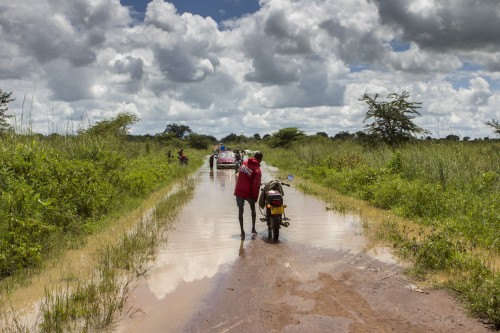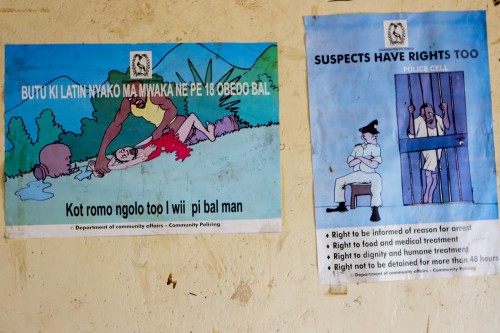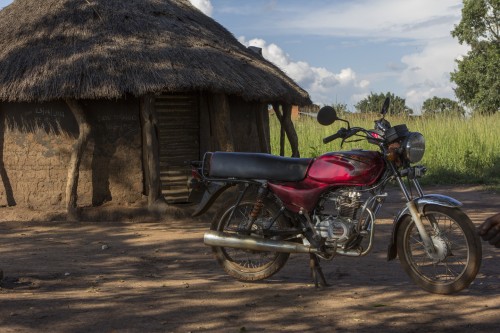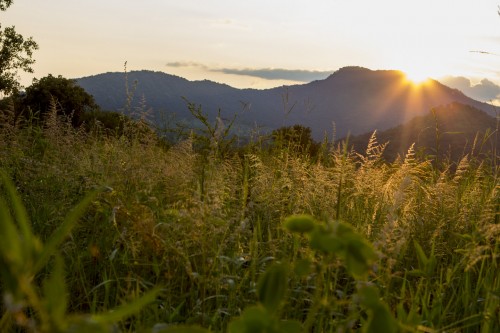When you travel long enough, and you meet enough people, you’ll eventually come across a properly unrecorded myth. A story that people in an area know and which might have existed for a time in the national historical memory, but has nevertheless since retreated into obscurity. There’s a story about the concrete thrones of Idi Amin that structured the antics below. And it’s a myth of that sort.
I first encountered the story maybe four years ago in Kampala, talking to Will Boase, an expat photojournalist who’d come across the thrones accidentally when trailing the Ugandan opposition candidate Norbert Mao on his electoral campaign. Mao and his entourage had gotten lost somewhere in the far north of Uganda – a region called Agoro Hills – and had arrived at a site atop a mountain which was once the holiday retreat of Ugandan dictator Idi Amin Dada, His Excellency, President for Life, Field Marshal Al Hadji Doctor Idi Amin Dada, VC, DSO, MC, Lord of All the Beasts of the Earth and Fishes of the Seas and Conqueror of the British Empire in Africa in General and Uganda in Particular.
The retreat was intended to serve as his home away from Kampala, where Amin could take a restful break from tyrannically murdering his subjects and running the country into the ground. There once existed, so the rumour had it, a mansion of some sort as well as – and this is particularly relevant to the story being told here – a series of thrones made out of concrete in which Amin and his consorts (the words of an Amoro sub-county official, though that all comes later) could sit and take in the view. Kind of a spectacularly unfunny version of the ‘everything the light touches, Simba…’ scene from the Lion King.
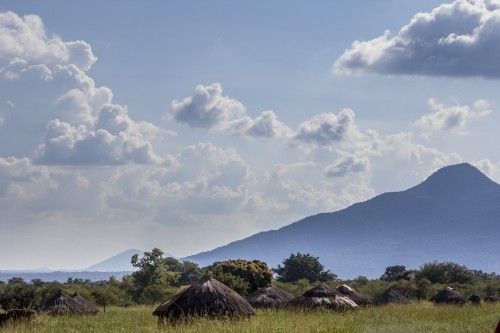
The view from when you are not on the top of the mountain, sitting in a fat throne, is pretty great all by itself.
As Will told it, the view was incredible, and the place itself was a kind of bizarre outlier in what is otherwise an incredibly undeveloped area of the country, right close to the border with South Sudan. After (or during?) Amin’s toppling, someone (the Tanzanians?) tore much of the mansion apart, and only the thrones still apparently remain intact. Likely due to the fantastical remoteness of the site, the mountaintop retreat subsequently became what is now the Lututuro prison, during the basically constant rule of Yoweri Museveni since.
Yet, if you google any combination of ‘Amin mansion’, ‘Agoro Hills’, or ‘Lututuro Prison’, you will find essentially nothing.
Will’s account of the place’s existence was backed up by my landlady in Kitgum and her family’s regular motorbike driver, Peter. Neither had heard of the thrones specifically, but both knew of an Amin complex on the site that was now the Lututuro prison.
I’d wanted to see the thrones since I’d first heard about them, and the prospect of it being only a few hours of rough bike riding away from Kitgum was too much to pass up. Peter agreed, and we decided to set off early in the morning on a boda (a small, 100cc chinese-made motorcycle about whose life in East Africa books could be written) to try and find them. We’d been told the journey was perhaps 45 miles, which would turn out to be the first of many overly optimistic assessments of distance and difficulty of the day. But, in our favour, the skies were blue, the day was warm, and spirits were high as we set off on our crazy little quest.
About an hour or so into the journey, the road ahead became impassable as water from the last week of rain, coming ultimately from up ahead near Agoro somewhere, had washed out the road ahead with waist-high water. The disruption had brought out a festive bunch of local residents, with children playing in the current and anyone older either doing washing, turning a quick profit guiding cars and carrying motorbikes across the water, or watching all of the above from the sides.
After having its exhaust plugged with leaves to keep the water out, our bike was then carried by a dozen or so porters across the flood, while Peter and I waded through the thigh-high current to reach the other side after it. Me praying to some nonspecific god that I (and my backpack full of recording gear) don’t fall into the river. Of all of the insurers in all of the world, I believe my German one would be the least impressed with any story of lost video equipment beginning as this one has.
Once on the other side, it was back atop the bike and off at speed. Until essentially the exact same scene reappeared. Just with more and deeper water, during whose crossing some helpful soul decided to lift Peter’s phone and disappear with it. A fact we didn’t notice until a good 5km onwards, where Peter did a quick about-turn to go retrieve it, and I sat and waited on the side of the road in the middle of nowhere, greeting confused passers by with the Acholi of a two-year-old. The man with the phone was nowhere to be found, sadly, and wasn’t picking up calls. Either because there was no reception (not unlikely), or because petty theft is a universal part of the human condition. Either way, with nothing more to be done but go forward, the quest continued.
Arriving in the Agoro Hills from the south (and there appear to be few other directions from which to do so, apart from scattered South Sudanese footpaths in the north), is to watch a giant shark fin-shaped mountain draw closer from the West until you find yourself quickly encircled by large yellow-green hills emerging from flat grassland punctuated with thatched huts here and there. The closest town to the foot of the mountain atop which Lututuro prison resides is little more than a Y in the road with a dozen cement shop fronts trading oil, charcoal, beer, and things made in China.
In front of one of these stores, playing cards under the shade were four men in army-style khakis, with the word ‘PRISON’ stitched in solid black font on them. Striking up a conversation in a mix of English (me) and Acholi (Peter), it quickly became clear that without some kind of formal authorisation letter, or (for some bizarre reason) me being a member of a christian faith organisation, we were not going to be allowed anywhere near the mountaintop. I had no letter, and clearly look nothing like someone with a rousing faith in god. In retrospect, it should have seemed obvious that one doesn’t simply stroll up to a prison with a camera in hand and get let in, but somewhere in all the bravado of forging out into the wilderness in search of a cool story, that thought hadn’t actually occurred at any moment beforehand. Somehow.
Peter suggested that we take a detour further north, to the town of Agoro itself, to go and arrange the required letter of permission. Which seemed an exercise in vain hope, given the so far apparent lack of electricity, running water or paved roads. Nevermind the kind of structured bureaucracy that produces letters of permission. Still, I’d no better idea, so off to Agoro we went.
All was fine on the journey for the first part. Miles of greeny-yellow grasslands, surprised children screaming variations on ‘MzunguHowAreYou?!’ from the roadside, goats with a predilection for sleeping in the middle of the path, and the occasional heard of cattle with horns as large as my legs. Around fifteen kilometers from Agoro, though, a cable in the bike’s handlebars snapped, rendering the clutch, or something like it, non-functional. Moments later, a possibly related snarling of the chain properly put an end to the bike. Despite a concerted effort to try and fixing it by committee, we had no choice but to start pushing the bike down the road to to Agoro. Which was still far enough away as to be invisible, somewhere at the foot of a distant mountain that improperly marks the border between Uganda and South Sudan, but still much closer than the trading post we’d been traveling from. To go back would have meant at least a day walking in the opposite direction.
Fortune, though, appeared to be balancing the beatings with affection, and after only a few hundred meters of pushing, we encountered a motorbike headed to Agoro, which I was then put on to go and arrange the permission letter. The plan being that the bike would then return with a mechanic to assist Peter, and we would meet up in the town afterwards.
Agoro, which indeed turned out to be exceedingly far away at around 20km from the South Sudanese border, and twenty minutes of bike riding from where we had broken down, was only marginally larger than the trading post outside the prison. The boda driver dropped me at a police outpost, comprising a falling-apart, musty room adjacent to somewhere with a bleeping police radio and some well-intended, but graphic, anti-rape posters donated by NGOs. A policeman, confused to arrive while I was taking pictures of their informational posters, walked me across an open piece of grass to the Agoro sub-country office – partly to be helpful, and partly to rid his own office of my strangeness. An in-retrospect-obviously-government building painted in a coat of conspicuously white paint, the Agoro sub-county office featured a faded, weathered noticeboard with a mix of local news and printed-for-stapling government notices, and a glorious view of the border mountains.
George, the cheery, round, senior assistant secretary for Agoro sub-county was in his office waiting for the staff doing the national census in the district to return when I stuck my now-badly sunburned and dehydrated face in. To my surprise (and not inconsiderable joy) George had no problem at all handwriting a letter of permission for me to explore Lututuro prison, and certifying it with the official sub-county office stamp. He was initially under the impression that I must have come to learn about the cooperative irrigation scheme that Amoro is busy implementing, and though I hadn’t, it was interesting to hear about it regardless. Though that’s a substantial detour to this specific tale that can be told another day.
Letter in hand, and now starting to feel the effects of close to six hours of sitting on a bike on terrible roads in 32 degree heat, I made a temporary home out of a blue plastic deckchair beneath one of the store fronts on the main drag into town, nursing a bottle of water, relishing the salt in a chapatti, and watching life go by. A bicycle with the head of a cow mounted on the back. Followed by two further bicycles with the legs of what was presumably the same animal. The show-off teenage boy who couldn’t get his bike to start as his friends burst out laughing. The kind of situation that I am fairly sure translates universally. After about an hour, Peter rides into town on a healthy-sounding, solidly repaired bike, and when the finding of further water and general recouping of strength has been completed, it’s back off to the trading post triumphantly bearing the letter of permission.
Until at roughly the same spot outside of Agoro, the rear tyre of the bike bursts. Which would be funnier, if it wasn’t one more in a now very long string of obstacles on the universe’s part. Though even then luck and misfortune keep up their crazy, sadistic dance. As we roll the bike off the road to a grass hut about a hundred meters away, its occupants just happen to have a spare, new-in-packaging bike tube and all of the tools to install it for the equivalent of three dollars.
Having no mechanical skills to contribute, I entertain kids with the old ‘look, it’s you’ game on my camera, to wild laughter and smiles. All the men, meanwhile, pull off the rear tyre, swap out the tube and install the new one in just under an hour. Then it’s back off down the orange dirt, with the shark-fin mountain letting us know we are finally returning to the trading post, albeit much, much later in the day.
I’ve become hypersensitive to even the slightest changes in the sound of the engine by now, or to how the bike feels going over the ground. Everything feels as if it might be about to break. Given our luck so far, it’s hard to have faith that we aren’t perpetually seconds away from some life-threatening mechanical failure.
But no.
We make it back to the trading station just fine, and the guards ambivalently wave us on. It’s no problem to go to the prison now, as we have our stamped letter and are for all intents and purposes allowed to go wherever we like, faith-based organisational membership or no. Except that there is one last complication. The road up the mountain is impassable to motorbikes, and there are no cars going up any time this late in the day.
We try to hurriedly hike it as the sun begins to set, but even riding the bike to the base of the hill and scrambling, it’s clear before we’ve gone too far that we’ll never make it. There’s at least an hour of steep climbing to do, with perhaps 30 minutes of light left in the sky. We have the letter, at least, so decide to turn back, to try and get as far back home towards Kitgum as we can before night sets in properly and then return in a week to try again. Clouds full of lightning are already gathering on the southern horizon that we will still need to get through. And the river crossings will be dark, flooded, and devoid of people who can help. So it’ll be a tough ride even without adding running up a mountain to the mix.
But that ride home is an endnote to the quest. Or to today’s part of it at least. I’ll be badly sunburned and sore tomorrow, but we’ll be back, better prepared to tackle that last stretch in a week. The prison, at least, is not a fantasy. We’d seen the tops of the buildings from the base of the mountain. So there’s something there after all. Some stories are just of the two-part variety.


